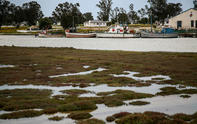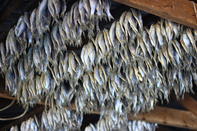Fishing Enterprise
The little town of Velddrif was first discovered by Portuguese seafarer Vasco da Gama in 1497 when he was looking for water in the St Helena Bay. Ever since, the area has a colorful maritime history. In 1693, a Dutch ship ran aground near Velddrif at the Berg River mouth, Seven crew members made it to shore and were rescued by the Hottentot tribe that occupied the area. A rescue ship was sent, and over the next few years explorers from the Cape travelled to the area for its sublime fishing spots. The first Eurpean to settle in the area was Carl Stephen and he named it Laaiplek (loading place). He and his brothers started a flourishing shipping, fishing and farming enterprise in the area. In the 1800’s a Dutch Reformed Church was built in the area around the town’s fishing enterprise.
Laaiplek became a harbour, and ships entered through the river mouth. On the other side of the river, a village was located 2 km further upstream and was named Velddrif (field crossing) because of a farmer that used such a crossing to get his livestock across the river. The town was formally recognised in 1946. In 1959 a bridge was completed across the river to provide access to the Cape, which allowed Velddrif to flourish.
Over the years the fishing industry grew in Velddrif, with factories for fish canning and the making of fish meal products being the chief industries. Along the river are a number of salt pans where salt is collected by a locally established company. One of the oldest industries in the area is no doubt the drying of fish which is done on the banks of the Berg River. Large sardines or haarders as they are called are caught in the bay or river mouth and are salted and hung out to dry. Other than the fishing industry the area has over the years developed a tourist industry which concentrates on the river.

